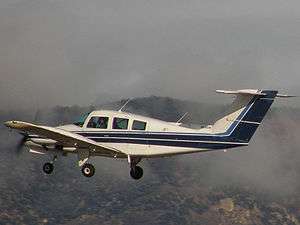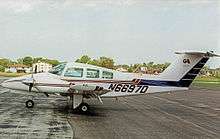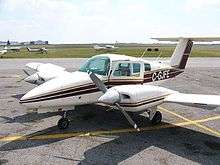Beechcraft Duchess
| Model 76 Duchess | |
|---|---|
 | |
| 1978 model Beech 76 Duchess operated by the National Test Pilot School at the Mojave Airport | |
| Role | Four-seat cabin monoplane |
| Manufacturer | Beechcraft |
| First flight | September 1974[1] |
| Introduction | 1978[1] |
| Primary user | Flight schools[1] |
| Number built | 437 |


The Beechcraft Model 76 Duchess is an American twin-engined monoplane built by Beechcraft.[1]
The Duchess is a cantilever low-wing monoplane with an all-metal structure, four seats, retractable tricycle undercarriage and a T-tail. It is powered by one 180 hp (134 kW) Lycoming O-360-A1G6D on the left wing and one LO-360-A1G6D on the right wing, which drive counter-rotating, constant-speed two-bladed propellers.[2]
Design and development
The Duchess was developed by Beechcraft from the single-engined Beechcraft Musketeer.
The prototype was first flown in September 1974 with the first production version flown on 24 May 1977. Deliveries to the Beech Aero Centers commenced early in 1978.[1]
The Model 76 was designed as an economical twin-engine trainer for the Beech Aero Centers and to compete with the very similar Piper PA-44 Seminole as well as the Cessna 310.[1]
The Model 76 incorporates engines that turn in different directions to eliminate the critical engine from single engine operation.[3]
The Duchess wing is of honeycomb construction fastened by bonding, rather than rivets, to reduce cost and produce a smoother aerodynamic surface.[3]
The Duchess is no longer in production but large numbers remain in use in flight schools around the world.
T-tail
The use of a T-tail on the Model 76 met with mixed critical reception when the aircraft was introduced. Plane & Pilot pronounced: "Outstanding design characteristics of the new Duchess include an aerodynamically advantageous T-tail, which places the horizontal surfaces above the propeller slipstream for better stability and handling.",[3] while Gerald Foster said: "[Beechcraft's] interest in T-tails was perhaps an affectation triggered by their wide use on jet airliners".[4]
Specifications
Data from Jane's All The World's Aircraft 1980–81[5] and 1978 Beechcraft Duchess Pilot Operating Handbook
General characteristics
- Crew: 1
- Capacity: 3 passengers
- Length: 29ft 0½ in. (8.86 m)
- Wingspan: 38 ft 0 in (11.58 m)
- Height: 9 ft 6 in (2.89 m)
- Wing area: 181 sq ft (16.81 m2)
- Airfoil: Root: NACA 63A413.2; Tip: NACA 63A415[6]
- Aspect ratio: 7.973:1
- Empty weight: 2,446 lb (1,116 kg)
- Useful load: 1,470 lb (668 kg)
- Loaded weight: 3500 lb (1590 kg)
- Max. takeoff weight: 3,900 lb. (1,772 kg)
- Powerplant: 2 × Lycoming O-360-A1G6D (on left wing; LO-360-A1G6D on right wing, turning in opposite direction) air-cooled flat-four, 180 hp (134 kW) each
Performance
- Never exceed speed: 194 knots (223 mph, 359 km/h)
- Cruise speed: 154 knots (177 mph, 285 km/h) at 10,000 ft (3,050 m)
- Stall speed: 60 knots (69 mph, 111 km/h) flaps down, (IAS
- Range: 780 nmi (898 mi, 1,445 km) at 12,000 ft (3,660 m) (econ cruise) - 151 knots
- Service ceiling: 19,650 ft (5,990 m)
- Rate of climb: 1,248 ft/min (6.3 m/s)
See also
Related development
Aircraft of comparable role, configuration and era
References
- Notes
- 1 2 3 4 5 6 Green, William: Observers Aircraft, page 48. Frederick Warne Publishing, 1980. ISBN 0-7232-1604-5
- ↑ Frawley, Gerard (2003). The International Directory of Civil Aircraft, 2003-2004. Fyshwick, ACT, Australia: Aerospace Publications Pty Ltd. p. 41. ISBN 1-875671-58-7.
- 1 2 3 Plane and Pilot: 1978 Aircraft Directory, page 84. Werner & Werner Corp, Santa Monica CA, 1977. ISBN 0-918312-00-0
- ↑ Montgomery, MR & Gerald Foster: A Field Guide to Airplanes, Second Edition, page 92. Houghton Mifflin Company, 1992. ISBN 0-395-62888-1
- ↑ Taylor 1980, pp. 268–269.
- ↑ Lednicer, David (October 2007). "The Incomplete Guide to Airfoil Usage". Retrieved 2008-07-27.
- Bibliography
- The Illustrated Encyclopedia of Aircraft (Part Work 1982-1985). Orbis Publishing.
- Simpson, R.W. (1991). Airlife's General Aviation. Shrewsbury, England: Airlife Publishing. ISBN 1 85310 194 X.
- Taylor, John W. R. (1980). Jane's All The World's Aircraft 1980–81. London: Jane's Publishing Company. ISBN 0-7106-0705-9.
External links
![]()